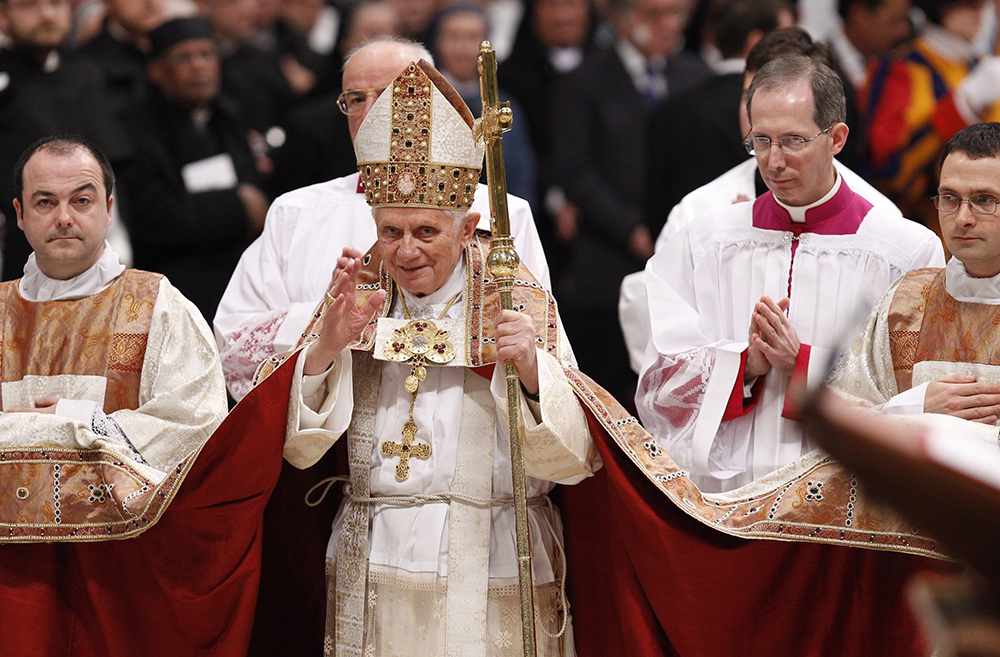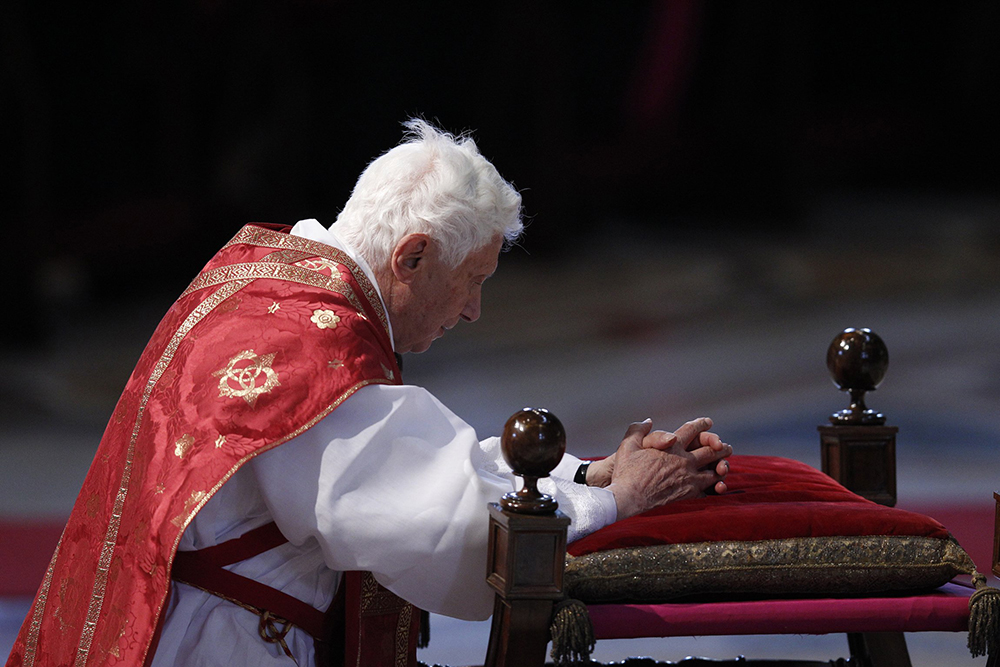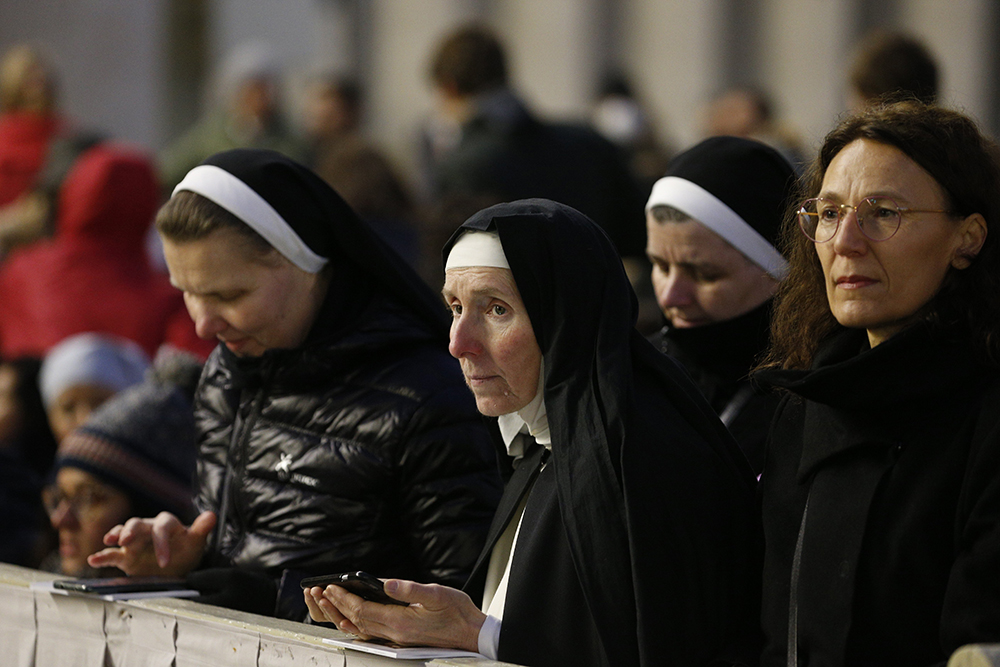
Pope Benedict XVI waves as he leaves after celebrating vespers with members of religious orders in St. Peter's Basilica at the Vatican on Feb. 2, 2011, the feast of the Presentation of the Lord and the World Day for Consecrated Life. (CNS/Paul Haring)
After Pope Benedict XVI died Dec. 31, Global Sisters Report contacted representatives of the International Union for Superiors General for further reflection beyond the organization's initial statement by Sr. Nadia Coppa, an Adorer of the Blood of Christ and UISG's new president. (The subsequent story on sisters' reaction appeared here.)
Coppa provided GSR with extended reflections on several questions via email. Her responses have been slightly edited and condensed.
GSR: Do you think Benedict's chief contribution to the church was as a theologian or as a pastor?
Coppa: Pope Emeritus Benedict XVI lived and conceived his pontificate as a service of love, as a presidency of love, aware that the doctrine of the church reaches the hearts of every person only if it leads to love.
As a theologian and lover of truth, Benedict opened a very profound reflection on two important themes: truth and love, which are not contradictory terms but demand and nourish each other, since truth without love can become brutal and love without truth can become banal.
Pope Benedict, in his rich magisterium, never lost sight of the faith of the simple. Rather, he was convinced that the truth of the faith is ultimately manifested to simple and humble hearts and can be grasped only with the eyes of faith, as he himself said in his Christmas 2010 Urbi et Orbi message: "If Truth is Love, it calls for faith, for the 'yes' of our hearts." Let unifying love be your measure, enduring love be your challenge, self-giving love be your mission.
His legacy will undoubtedly remain his magisterium, which he exercised not only with his three encyclicals — Deus Caritas Est, Spe Salvi, and Caritas in Veritate — but also during the general audiences with his profound catechesis.

Sr. Nadia Coppa (Courtesy of UISG)
The dialogue between faith and reason was essential for Benedict XVI, especially because God himself is logos. Logos is not only mathematical reason, but also has a heart and is love. From this, Pope Benedict drew the following conclusion: "Truth is beautiful, truth and beauty go hand-in-hand: beauty is the seal of truth."
Pope Benedict strove above all for the liturgy to be celebrated in its beauty because it is a celebration of the presence and work of the living God and because it is meant to lead us to and into the mystery of God.
The most beautiful legacy delivered to us by Pope Benedict is the primacy of God and the centrality of Christ. What is striking about Benedict XVI is his Christocentric witness in his proclamation and in his work. The word of God is Christ himself, who is and must be at the center of the church and its life.
Illuminated by the light of faith, the papal ministry appears as a gift of the Holy Spirit to the church, and we can therefore also be grateful for the eight years in which Benedict XVI exercised his Petrine service.
Benedict leaves us a wonderful spiritual and ecclesial paternity, a legacy that has marked the 20th century and the first steps of the new millennium. He leaves us in our hearts a deep desire for prayer of thanksgiving for the suffering silently offered for the higher good of the church, for the many misunderstandings and injustices joyfully turned into prayer to God.
Advertisement
How will Benedict be most remembered?
His journey was full of profound reflections that represent an immense legacy of wisdom and faith that will remain in the heart and history of the church. His thoughts will continue to illuminate the path of all those who have found in him a light that illuminates the darkness of the world.
Pope Emeritus Benedict had always said that life is not a circle that closes, but a path that tends toward an encounter, a line that tends toward its fullness. We thank the Lord for the gift of his thought, the clarity of his faith, the simplicity with which he always lived and with which he communicated the depths of the mystery of God.
We have loved and supported this humble servant of the vineyard of God by welcoming the many prophetic insights of his magisterium and allowing ourselves to be questioned by his programmatic lines.
We will remember him for the prophecy about the future of the church: that the church will become small and have to start over more or less from the beginning. He said the church will no longer be able to inhabit the buildings it built in times of prosperity. It will also lose much of its social privilege and restart from small groups, movements and a minority that will put the faith back at the center of experience.

Pope Benedict XVI prays as he leads Good Friday service April 6, 2011, in St. Peter's Basilica at the Vatican. (CNS/Paul Haring)
What do you think Benedict's chief legacy was for sisters?
Looking back over the years of his pontificate, it is evident that Pope Benedict sought to lead consecrated life back to its original core, which is the form of life assumed by Christ.
"Belonging to the Lord," he told superiors general on May 22, 2006, "means to be on fire with his incandescent love, to be transformed into the splendor of his beauty: our littleness is offered to him as a sacrifice of sweet fragrance so that it becomes a witness of the greatness of his presence for our epoch, which has great need to be inebriated by the richness of his grace."
There was no lack of clear and incisive words during his pontificate about consecrated life as a witness and expression of the strong way of the mutual seeking of God and the human person in the attraction of love.
"The very fact of being consecrated makes the consecrated person, as it were, a 'bridge' to God for all who encounter him or her, a reminder, a reference point," Benedict XVI said in a Feb. 2, 2010, homily. "And this is all by virtue of the mediation of Jesus Christ, the consecrated one of the Father. He is the foundation! He who shared our weaknesses so that we might participate in his divine nature."
The profound renewal of consecrated life starts from the centrality of the word of God and, more concretely, of the Gospel. What is striking is its Christocentric witness that is expressed in its proclamation and its work. For Benedict XVI, discipleship was a loving response to Jesus Christ by living a personal friendship with him and inwardly renewing the will to converge to him by constantly turning the heart toward Easter, by which life acquires fullness.

Women religious pray in St. Peter's Square at the Vatican before Pope Francis' celebration of the funeral Mass of Pope Benedict XVI on Jan. 5. (CNS/Paul Haring)
Benedict recalled consecrated men and women to have the task of being witnesses to the transfiguring presence of God in a world that is disoriented and confused. He invited us to look at this time with the gaze of faith to be able to look at humanity, the world and history in the light of the crucified and risen Christ, the only star capable of orienting people.
We will remember Benedict for the constant call to overcome relativism that impoverishes faith and the search for God by favoring mediocrity.
Consecrated life is a plant rich in branches rooted in the Gospel. It is the Gospel lived daily that is the element that gives beauty to consecrated life and presents each person before the world as a reliable alternative. This is what today's society needs, and this is what the church expects from you: to be a living Gospel. To be Christ's means to keep burning in your heart a living flame of love fueled by the richness of faith not only when it brings inner joy, but also when it is united with difficulties, barrenness and suffering.
"The Lord," he said, "wants men and women who are free, not bound, able to give up everything to follow him and to find in him alone their very all. Courageous choices must be made, both at the personal and communal levels, which give a new discipline to the life of consecrated persons and bring them to rediscover the all-encompassing dimension of the sequela Christi."
To belong to the Lord: This is the mission of men and women who have chosen to follow Christ chaste, poor and obedient so that the world may believe and be saved. To be totally Christ's so to become a permanent confession of faith, a proclamation of the truth.
The nourishment of the inner life is prayer, an intimate conversation of the consecrated soul with the divine.
Pope Benedict encouraged us to be in the world a credible and luminous sign: Be fire of the Gospel and its paradoxes without conforming to the mentality of the world, but transforming ourselves and continually renewing our commitment to be able to discern God's will — what is good, pleasing and perfect to him.
His testimony as a man in love with God and a seeker of his Lord is an invitation to cultivate the constant yearning to search for a face that sometimes manifests itself and sometimes veils itself — "Faciem tuam, Domine, requiram" — and to direct the path, both in small daily steps and in the most important decisions, toward the fulfillment of this pilgrimage of the heart.
Benedict XVI leaves us with a deep desire in our hearts for prayer as a breath of the soul and an oasis of peace in which to draw the water that nourishes our spiritual life and transforms our existence. He leaves us with a longing for God, a yearning to seek God who makes himself known. By going out to meet him, God shows his face and heart, ignites us with his spirit making us wince with joy. The nourishment of the inner life is prayer, an intimate conversation of the consecrated soul with the divine.





